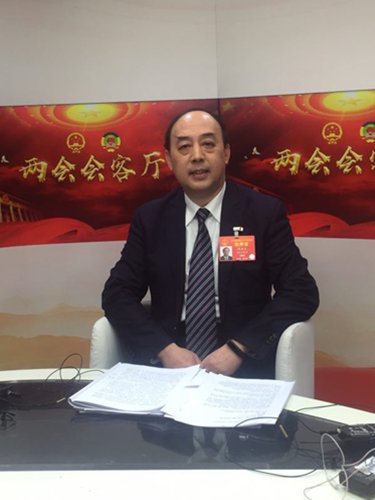
Pictured is Zhou Hongyu, a deputy to the 13th National People’s Congress. Photo: Courtesy of Zhou Hongyu
China’s publishing industry has seized the Belt and Road Initiative (BRI) as an opportunity to expand overseas markets while promoting economic and cultural exchanges among countries along the BRI routes, said a deputy to the 13th National People’s Congress (NPC).
Zhou Hongyu, a professor at Central China Normal University and deputy to the 13th NPC, told the Global Times on Wednesday that China’s publishing industry should be more international, and use books as a way to tell the world about China.
China has seen rapid growth in its publishing industry over the past four decades, with the number of publishing houses increasing from 105 to 580, the Xinhua News Agency reported in November 2018, citing the National Press and Publication Administration (NPPA).
However, the internationalization of China’s publishing industry faces many challenges, such as the shortage of copyright trade professionals and translators.
“Some less commonly taught languages like Arabic is one of the official languages of the United Nations, but there are very few people who understand Arabic in China, and even fewer people who know Arabic culture and could write in Arabic,” Zhou pointed out.
He suggested better training of professional personnel in copyrights and translation.
“Besides the training in language and copyright knowledge, relevant departments should also teach laws and regulations, cultural traditions, ethnic customs and religious taboos of the countries along the routes of the BRI to avoid misunderstandings and conflicts,” Zhou said.
The government should encourage colleges and universities to cultivate more translators in some less commonly taught languages of the countries along the BRI, Zhou noted.
“New courses of some less commonly taught languages of the countries along the routes of the Belt and Road initiative, including Belarusian, Kurdish, Maori, Bislama and Dhivehi, will also be offered in some universities,” Fan Hailin, a deputy director of Department of Higher Education under China’s Ministry of Education, said at a press conference in late February.
Beijing Foreign Studies University and Shanghai International Studies University, China’s two leading language universities, have added 11 less common language majors, most of which are languages of countries participating in BRI, according to Fan.

The Chinese Books Arabic Copyright Cooperation Signing Ceremony is held in Cairo, Egypt, Feb. 12, 2019. China’s Xinhua Winshare Publishing and Media Company and Egypt’s Dar Al-Shorouk Publishing House Group on Tuesday signed a protocol and a cooperation contract in the fields of publishing and translation at the Chinese Cultural Center in Cairo. Photo: Xinhua
Zhou also called for the establishment of a communications platform for overseas sinologists who are familiar with the history and culture of countries along the BRI route.
He said the move will help encourage these sinologists to communicate with Chinese publishers and to actively participate in translating as well as promoting Chinese publications.
Aside from professional training, subsidies to BRI-related publishing and translating projects should be increased, government support should also be enhanced to safeguard Chinese publishing employees working in BRI countries, Zhou said.
He said the move will help encourage these sinologists to communicate with Chinese publishers and to actively participate in translating as well as promoting Chinese publications.
Aside from professional training, subsidies to BRI-related publishing and translating projects should be increased, government support should also be enhanced to safeguard Chinese publishing employees working in foreign BRI countries, Zhou said.


